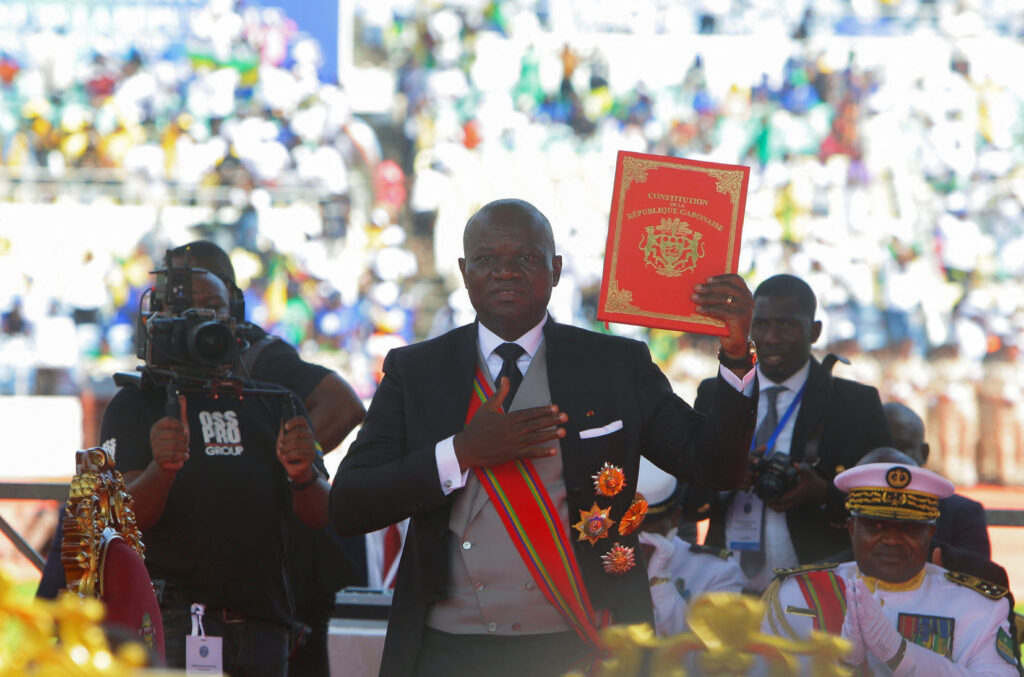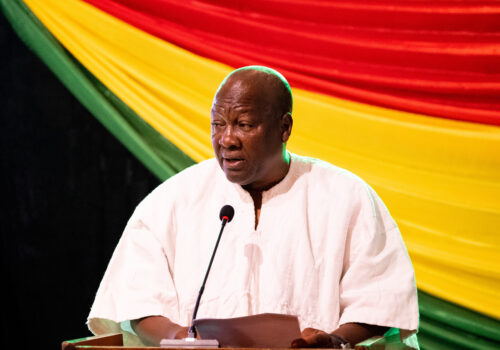Among West and Central African countries that have experienced coups in recent years, Gabon offers a small sliver of hope.
In 2023, Brice Oligui Nguema, the former head of Gabon’s Republican Guard, took power in a bloodless coup. This coup was carried out just one day after aging President Ali Bongo was reelected in a contest that many within the country viewed as a fraudulent attempt by Bongo and his allies to perpetuate the nearly sixty-year political dynasty that began when his father took power in 1967.
While it would be easy to wrap this event in the same blanket as the many other West and Central African military coups between 2020 and 2024 that disrupted an unprecedented period of peaceful civilian rule across the region, Gabon’s situation is different in several ways.
The military coups and their aftermaths in Mali, Guinea, Burkina Faso, and Niger have followed a similar pattern: They all occurred in poor and unprosperous countries; they were all followed by some sort of in-fighting or conflict within interim governments (and a second coup in the case of Burkina Faso); and the elections promised in all four countries have yet to take place.
By contrast, Gabon enjoys a comparatively enhanced level of national wealth and societal prosperity. With a population of just 2.3 million people and vast reserves of oil, gold, and manganese, Gabon boasts the second-highest gross domestic product (GDP) per capita in continental Sub-Saharan Africa. It also has the third-highest prosperity score among the region’s countries in our Freedom and Prosperity Indexes, which measure prosperity levels across 164 countries by tracking income, health, inequality, environmental health, the treatment of minorities, and education. While Gabon suffers from a level of income inequality that rivals other countries in the region, on the whole, it is more prosperous than its West and Central African counterparts. Furthermore, while Gabon’s coup did give way to an interim military government, there was little to no post-coup conflict. And Gabon held democratic elections on April 12, 2025, that, while not without significant flaws, were nevertheless acclaimed by local, regional, and international observers as peaceful, lawful, and fair.
Gabon is more prosperous than its neighbors
Turning the page on the Bongo dynasty
In the weeks leading up the first election since the 2023 coup, Nguema’s picture could be seen plastered all over the capital city of Libreville. After serving as interim president for nineteen months, he was officially elected president on April 12, winning more than 90 percent of the vote. Both before and after the election, Nguema pledged to “restore dignity to the Gabonese people” and to root out the country’s corruption, which the legal subindex of our Freedom Index indicates is among the worst in Sub-Saharan Africa.
Despite these popular goals, the president has not been without his detractors. Such high vote shares are often indicative of corruption, and critics of Nguema note that he has long been a part of the corrupt political system he pledges to dismantle and that he broke his promise to relinquish power after deposing Bongo. In fact, Nguema is Bongo’s cousin and recently allowed Bongo and his wife to relocate to Angola despite them facing ongoing (but unspecified) corruption charges.
And although voter turnout was high and local observers were largely satisfied with the integrity of the election, Nguema’s most prominent opponent—former Prime Minister Alain Claude Bilie-By-Nze—accused Nguema of taking advantage of state resources to fund his campaign.
Furthermore, his interim government adopted a new constitution in 2024 that the Africa Center for Strategic Studies argues grants too much power to the executive and specifically favored Nguema. For example, the new constitution prevented a major political opponent from running in the election by banning candidates over seventy years of age. It also broke from past tradition by including a clause that allows military members to run in elections, extended the length of presidential terms to seven years, and eliminated the position of prime minister altogether. During Nguema’s time leading the interim government, he also suspended all political parties in a move that critics say gave him a distinct electoral advantage.
While Nguema was greeted with scenes of celebration after carrying out the 2023 coup and won an election victory indicative of overwhelming public support, it remains to be seen whether he is willing and able to instigate meaningful democratic reforms.
Yet, even if competition was restricted in this election, the very fact that it happened and that the Gabonese people were able to peacefully vote for someone other than a member of the Bongo family shows that there is an appetite for change and a willingness to engage in the most fundamental act of democracy.
In short, the years since the coup have provided both reason to believe that a more democratic future in Gabon is possible and reason to fear that Nguema is simply replacing the Bongo family’s form of autocracy with his own.
What the data tell us
The Freedom and Prosperity Indexes highlight a number of trends indicating that a country’s surest path to prosperity involves improving political and economic freedom, as well as the rule of law. Conversely, the data tell us that restricting freedom is a proven way to diminish societal well-being.
When a country experiences a freedom shock—meaning the one-year drop in its Freedom Index score is among the top 20 percent globally since 1995—its progress on prosperity tends to stall or even reverse as time goes on.
A country’s prosperity tends to stall or decline after experiencing a freedom shock
The drop in Gabon’s freedom score from 2022 to 2023 was among the most severe freedom shocks ever recorded—within the top 5 percent of one-year declines over the past thirty years. This decline was driven by a sharp dip in the country’s political freedom score, which was in turn driven by an even sharper fall in its elections score, which measures the extent to which political leaders are chosen in open, clean, and fair elections.
Gabon’s political freedom has declined sharply in recent years
Furthermore, out of the forty-six countries in Sub-Saharan Africa for which we have data, Gabon ranks thirtieth in the judicial independence and effectiveness indicator and thirty-eighth in the legislative constraints on the executive indicator.
Gabon’s judicial independence is below the regional average
Gabon’s executive has fewer legislative constraints than the regional average
It is important to recognize that these issues were fomented by the Bongo regime. However, the disempowered nature of the judiciary and legislature and the recent broad decline in political freedom show that Nguema must act quickly to reverse course before declines in freedom hinder Gabon’s long-term progress on prosperity. The country’s freedom score has changed very little in the time that Nguema has held power as interim president, with political freedom in further, albeit minimal, decline.
Despite Gabon’s impressive prosperity levels and per capita GDP in relation to its neighbors and to the broader Sub-Saharan Africa region, over one-third of the population currently lives in poverty. The Bongo family was known for gorging themselves on resource wealth while much of the population was left to suffer. Despite its high overall prosperity score, Gabon ranks in the bottom third of all Sub-Saharan African countries in the inequality component of the Prosperity Index. It has the fourth-highest unemployment rate in Sub-Saharan Africa, with over 20 percent of the total labor force—and 40 percent of young people—currently unemployed. If Nguema falls back on the autocratic habits of his predecessor and chooses personal wealth over the well-being of his country, any hope for democracy in Gabon that followed the 2023 coup will quickly die out.
The path to enduring freedom and prosperity
The data clearly show that establishing democracy as the political norm will help Gabon set itself apart from its neighbors and enhance national prosperity.
To create a strong and vibrant democracy, Nguema must first come to terms with the idea that his tenure as president is not indefinite. He must also commit himself to empowering core institutions of democracy such as the legislative branch and courts, and he must protect the societal freedoms that are fundamental to thriving democracies. This should include allowing political parties to exist and organize and lifting targeted age limits for presidential candidates.
By committing to competitive democracy and political freedom, Nguema can most effectively enhance prosperity and, in particular, reduce the inequality that has plagued Gabon for so long. It is too early to tell for sure whether Nguema has assumed the presidency with the intention of institutionalizing democracy and reducing inequality in Gabon or with the intention of ruling as an autocrat. What is certain is that the end of the Bongo regime—and the democratic impetus provided by the national election—provides Nguema with the opportunity to turn Gabon into the success story that West and Central Africa has been yearning for. For the good of the people who elected him, Nguema should do everything in his power to capitalize on it.
Will Mortenson is a program assistant at the Atlantic Council’s Freedom and Prosperity Center.
Correction: This article was updated on June 4, 2025, to reflect the fact that Gabon is located in Central Africa, not West Africa.
Further reading
Mon, Mar 17, 2025
To improve its Sahel policy, the US must update four assumptions
AfricaSource By
By reevaluating long-held assumptions and adapting policy to the rapidly changing geopolitical environment, the United States can play a vital role in the Sahel region.
Tue, Dec 10, 2024
In Ghana, incoming President John Mahama must follow debt restructuring with economic reform
New Atlanticist By Rabah Arezki
The Mahama administration will need to focus on increasing transparency and the removal of corporate subsidies. But for its reform agenda to work, Ghana must receive support from the international community to expedite its debt restructuring.
Thu, May 15, 2025
African governments should rethink their approach to combating money laundering and terrorist financing
AfricaSource By Benjamin Mossberg
African countries can bolster financial inclusion and tap economic growth opportunities—while preventing the abuse of the global financial system by nefarious actors.
Image: Gabon's President-elect Brice Clotaire Oligui Nguema takes the oath of office during the swearing-in ceremony in Libreville, Gabon May 4, 2025. REUTERS/Minkoh Malkolm.




